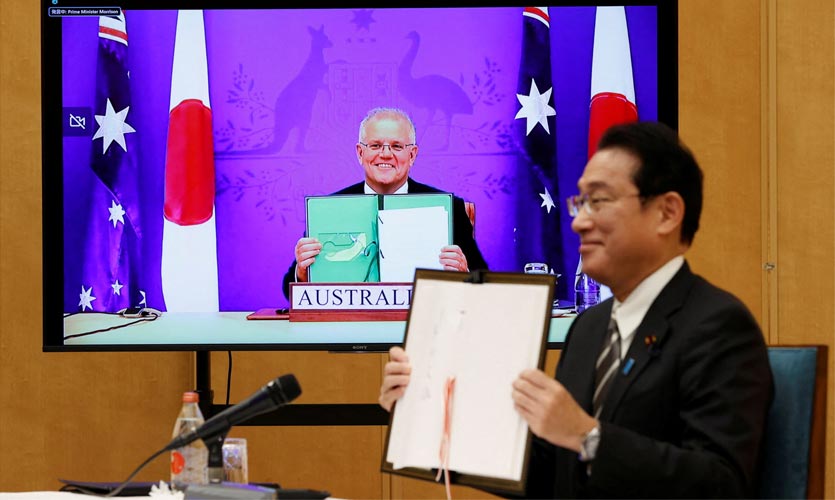A new defence agreement between Japan and Australia signed on Thursday was hailed as a breakthrough, with Reuters reporting it as an attempt at strengthening security ties in the backdrop of rising Chinese military and economic might. Japanese Prime Minister Fumio Kishida and his Australian counterpart Scott Morrison signed a pact that has been in the making for several years, during a virtual summit. The Australian government has partnered with Japan, India, the United States, and Britain to strengthen defence ties amid concerns about China,including its aggression towards Taiwan and freedom of navigation in the region.
Morrison said that the Reciprocal Access Agreement (RAA), Japan’s first with another country, will enable Australian and Japanese militaries to cooperate seamlessly on defence and humanitarian missions. The signing of the RAA comes after more than a year of negotiations, according to Japan’s Kyodo News. The treaty would eliminate limits on the transfer of weapons and supplies for cooperative training and disaster relief missions, and allow for speedier deployment of Japanese and Australian military troops. According to analysts, the deal recognises the significance of forging strong defence alliances in order to discourage Beijing.
Commenting on the deal at the signing ceremony, Morrison stated, “Japan is our closest partner in Asia as demonstrated by our special strategic partnership, Australia’s only such partnership – an equal partnership of shared trust between two great democracies committed to the rule of law, human rights, free trade and a free and open Indo-Pacific.”
“The RAA is a landmark treaty which opens a new chapter for advanced defence and security co-operation of what is a complex and rapidly changing world, something you and I both understand very well,” Morrison reportedly told the Japanese leader.
A Japanese foreign ministry official said that Kishida hailed the deal as a “breakthrough” and pledged that ties with Australia would be used as a model for international security cooperation. The official said that Kishida and Morrison also agreed to update a 2007 Japan-Australia Joint Declaration on Security Cooperation at the earliest to set a clear direction for their ties. According to the joint statement issued after the summit, Kishida and Morrison stressed the importance of peace and stability across the Taiwan Strait. Morrison said that stronger ties with Japan were necessary “to deal with a new and even more challenging environment, particularly in the Indo-Pacific”.
Besides its strategic significance for Asia and the Indo-Pacific, the RAA reinforces trends that are part of the changing security landscape in the region. Among other things, it signifies a shift from a US-centric focus towards bilateral ties and regional groupings. This is also a sign that Japan is willing to take a more active role in the region.
A more empowered and committed regional strategic network is evident in the Quadrilateral Security Dialogue (or Quad, with India, Japan, Australia and the US), the AUKUS, and now the RAA between Japan and Australia – two treaty allies of the US. As per the Indian Express, one factor that made this possible was Australia’s willingness to stand up to China on the issue of a free-and-open Indo-Pacific and rules-based global order, despite their strong economic ties. For Japan, this marks an even greater shift with the recent evolution in its outlook and global image after aligning with the US as its major defence ally. As part of an alliance that Washington describes as the foundation of regional security, Japan and the US have a status of forces agreement, which allows the latter to base warships, fighter jets, and thousands of troops in and around Japan.
The Philippines and Vietnam have both turned to Tokyo recently for protection against Beijing, signalling that they accept Japan’s role as a strategic player. Japan is now reportedly preparing to seek RAA-like agreements with the UK and France as well. The signing of the Australia-Japan treaty comes months after Canberra announced the formation of AUKUS with the United States and the United Kingdom.
Read more: Biden Administration Sanctions Chinese Imports, Condemns Persecution Of Uyghur Muslims
In its own right, New Delhi has done much to enhance bilateral, trilateral, and regional cooperation in the security sector. It has both bilateral and multilateral ministerial dialogues with Tokyo and Canberra, and needs to continue this engagement and reach out to other regional players.
There was no immediate comment from Beijing on the new pact. As tensions over Chinese-claimed Taiwan have been rising, President Xi Jinping has sought to assert China’s sovereignty over the democratically ruled island.
The Australia-Japan treaty underscores the thrust its aggressive stance has provided to middle powers to expand their cooperation and build on the momentum created by the Quad.










